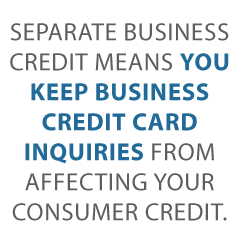You can get business credit cards that do not report to personal credit. This is the case despite what’s going on with the novel coronavirus.
How to Establish Separate Business Credit: Get Business Credit Cards That Do Not Report to Personal Credit
What do you know about how to establish separate business credit? Business credit cards that do not report to personal credit are not out of reach. We know the secrets!
Remember that any inquiries into your consumer credit score will negatively impact that score. And a lot of merchants and lenders will carry out inquiries when working with you for the first time. Separate business credit means you keep business credit card inquiries from affecting your consumer credit.
COVID-19 and Recession Era Financing
As the novel coronavirus continues to disrupt our lives, your business will still need financing!
How to Establish Separate Business Credit: Get a D&B D-U-N-S number
Start at the D&B website and obtain a cost-free D-U-N-S number. A D-U-N-S number is how D&B gets a small business in their system, to generate a PAYDEX score. If there is no D-U-N-S number, then there is no record and no PAYDEX score.
Once in D&B’s system, search Equifax and Experian’s sites for the business. You can do this at https://www.creditsuite.com/reports/. If there is a record with them, check it for accuracy and completeness. If there are no records with them, go to the next step in the process.
This way, Experian and Equifax will have activity to report on.
How to Establish Separate Business Credit: File a DBA
If you operate a small business as a sole proprietor, then at the very least be sure to file for DBA (‘doing business as’) status.
If you do not, then your personal name is the same as the small business name. Because of this, you can find yourself being personally liable for all small business financial obligations.
But keep in mind – don’t treat a DBA filing as anything beyond a steppingstone to incorporating.
How to Establish Separate Business Credit: Go Beyond a DBA and Make Your Small Business a Distinct Legal Entity through Incorporation
Meet with your tax consultant or financial planner. And together, pick which legal entity (sole proprietor, LLC or S-Corp) will most effectively fit your company and particular financial circumstances.
Incorporation can also help to secure your personal assets. That is in the event of a lawsuit. Once your corporation or LLC is registered on your state’s Secretary of State’s website, you can then get a Business Federal Tax ID Number. So then you can open your business’s bank account.
How to Establish Separate Business Credit: Get an EIN
Visit the IRS website and get an EIN for the company. They’re free of charge. Pick a business entity such as corporation, LLC, etc.
A small business may get started as a sole proprietor. But they absolutely need to change to a variety of corporation or an LLC.
This is to diminish risk. And it will make best use of tax benefits.
A business entity matters when it comes to taxes and liability in case of litigation. A sole proprietorship means the entrepreneur is it when it comes to liability and taxes. Nobody else is responsible.
The best thing to do is to incorporate. You should only look at a DBA as an interim step on the way to incorporation.
How to Establish Separate Business Credit: Company Fundability
A small business must be reputable to lending institutions and merchants. That is why, a small business will need a professional-looking website and email address, with website hosting bought from a merchant such as GoDaddy.
And company phone numbers must have a listing on ListYourself.net.
At the same time the company telephone number should be toll-free (800 exchange or similar).
A corporation will also need a bank account dedicated strictly to it, and it must have all of the licenses essential for operation. These licenses all have to be in the accurate, accurate name of the company, with the same small business address and phone numbers.
So note that this means not just state licenses, but potentially also city licenses.
How to Establish Separate Business Credit: Build Business Credit
Business helps to protect a business owner’s personal assets, in the event of court action or business bankruptcy. Also, with two separate credit scores, an entrepreneur can get two separate cards from the same merchant. This effectively doubles purchasing power.
Another advantage is that even startup companies can do this. Going to a bank for a business loan can be a recipe for disappointment. But building small business credit, when done correctly, is a plan for success.
Consumer credit scores depend on payments but also additional components like credit utilization percentages. But for company credit, the scores truly only hinge on whether a company pays its debts in a timely manner.
Business credit is an asset which can help your business for years to come.
The Process
Growing small business credit is a process, and it does not happen automatically. A small business has to actively work to develop business credit. However, it can be done easily and quickly, and it is much quicker than developing individual credit scores.
Merchants are a big aspect of this process.
Doing the steps out of sequence will lead to repetitive denials. Nobody can start at the top with small business credit.
Starter Vendor Credit
First you need to establish tradelines that report. Then you’ll have an established credit profile, and you’ll get a business credit score.
And with an established business credit profile and score you can begin to get credit for numerous purposes, and from all sorts of places.
These varieties of accounts tend to be for things bought all the time, like marketing materials, ink and toner, and office furniture.
But first of all, what is trade credit? These trade lines are credit issuers who give you starter credit when you have none now. Terms are oftentimes Net 30, versus revolving.
Therefore, if you get an approval for $1,000 in vendor credit and use all of it, you must pay that money back in a set term, such as within 30 days on a Net 30 account.
Details
Net 30 accounts need to be paid in full within 30 days. 60 accounts have to be paid in full within 60 days. In comparison with revolving accounts, you have a set time when you have to pay back what you borrowed or the credit you made use of.
To start your business credit profile the right way, you should get approval for vendor accounts that report to the business credit reporting agencies. As soon as that’s done, you can then use the credit.
Then repay what you used, and the account is on report to Dun & Bradstreet, Experian, or Equifax.
Vendor Credit – It Helps
Not every vendor can help like true starter credit can. These are vendors that grant approval with negligible effort. You also need them to be reporting to one or more of the big three CRAs: Dun & Bradstreet, Equifax, and Experian.
Here are some stellar choices from us: https://www.creditsuite.com/blog/5-vendor-accounts-that-build-your-business-credit/
Uline
Uline is a true starter vendor. You can find them online at www.uline.com. They sell shipping, packing, and industrial supplies, and they report to Dun & Bradstreet and Experian. You MUST have a D-U-N-S number and an EIN before starting with them. They will ask for your company bank information. Your company address must be uniform everywhere. You need for an order to be $50 or more before they’ll report it. Your first few orders may need to be prepaid initially so your company can get approval for Net 30 terms.
- How to apply with them:
- Add an item to your shopping cart
- Go to checkout
- Select to Open an Account
- Select to be invoiced
Marathon
Check out starter vendor Marathon. Marathon Petroleum Company provides transportation fuels, asphalt, and specialty products throughout the United States. Their comprehensive product line supports commercial, industrial, and retail operations. This card reports to Dun & Bradstreet, Experian, and Equifax.
Before applying for multiple accounts with WEX Fleet cards, make sure to have enough time in between applying so they don’t red-flag your account for fraud.
To qualify, you need:
- Entity in good standing with Secretary of State
- EIN number with IRS
- Business address- matching everywhere.
- D-U-N-S number
- Business License- if applicable
- Business Bank account
- A business phone number listed on 411
Your SSN is required for informational purposes. If concerned they will pull your personal credit talk to their credit department before applying. You can give a $500 deposit instead of using a personal guarantee, if in business less than a year. Apply online. Terms are Net 15. Get it here: www.marathonbrand.com.
Grainger Industrial Supply
Grainger Industrial Supply is also a true starter vendor. You can find them online at www.grainger.com. They sell hardware, power tools, pumps and more. They also do fleet maintenance. And they report to D&B. You need a business license, EIN, and a D-U-N-S number.
- To qualify, you need the following:
- A business license (if applicable)
- An EIN number
- A company address matching everywhere
- A company bank account
- And a D-U-N-S number from Dun & Bradstreet
Your corporate entity must be in good standing with the applicable Secretary of State. If your company does not have established credit, they will require additional documents. So, these are items like accounts payable, income statement, balance sheets, and the like.
Apply online or over the phone.
Accounts That Don’t Report
Non-reporting trade accounts can also be helpful. While you do want trade accounts to report to at least one of the CRAs, a trade account which does not report can also be of some worth.
You can always ask non-reporting accounts for trade references. Plus, credit accounts of any sort should help you to better even out business expenditures, consequently making financial planning less complicated.
More of How to Establish Separate Business Credit: Monitor Your Business Credit
Know what is happening with your credit. Make sure it is being reported and attend to any mistakes ASAP. Get in the habit of taking a look at credit reports. Dig into the particulars, not just the scores.
We can help you monitor business credit at Experian, Equifax, and D&B for a lot less than it would cost you at the CRAs.
Fix Your Business Credit
So, what’s all this monitoring for? It’s to dispute any errors in your records. Errors in your credit report(s) can be taken care of.
Disputes
Disputing credit report mistakes generally means you specifically itemize any charges you dispute.
Dispute your or your business’s Equifax report by following the instructions here.
You can dispute errors on your or your company’s Experian report by following the directions here: www.experian.com/small-business/business-credit-information.jsp.
And D&B’s PAYDEX Customer Service contact number is here: www.dandb.com/glossary/paydex.
A Word about Business Credit Building
Always use credit sensibly! Don’t borrow more than what you can pay off. Track balances and deadlines for payments. Paying on time and fully will do more to increase business credit scores than nearly anything else.
Building company credit pays off. Excellent business credit scores help a small business get loans. Your loan provider knows the small business can pay its financial obligations. They know the business is bona fide.
The company’s EIN links to high scores and lenders won’t feel the need to call for a personal guarantee.
How to Establish Separate Business Credit: Takeaways
Bolster the professionalism of your company and learn how to establish separate business credit.
You can get business credit cards that do not report to personal credit. Learn more here and get started in getting business credit cards that do not report to personal credit. The COVID-19 situation will not last forever.


